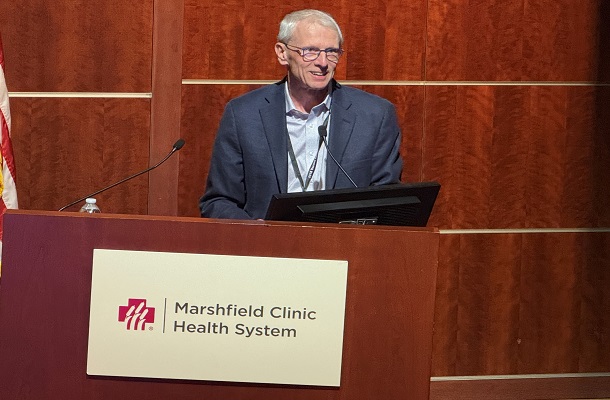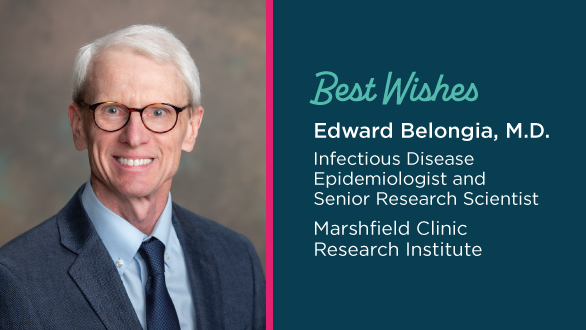Any discussion about vaccine safety over the past three decades within Marshfield Clinic Health System – and in many parts of the United States – included the research and work of Marshfield Clinic physician and global expert on flu vaccine effectiveness Edward Belongia, M.D.
Dr. Belongia, an infectious disease epidemiologist and senior research scientist, retired May 15 after nearly 30 years at Marshfield Clinic Research Institute.
“I loved my job and the people I worked with,” Dr. Belongia said. “Our vaccine and infectious disease research team has never been stronger. The scope and complexity of our research has grown over the past two decades, and our scientific teams have expanded. We have become nationally recognized for our research in respiratory virus epidemiology, vaccine safety, and vaccine effectiveness. For me, it’s been a rewarding journey, and this seems like good time to pass the torch to the next generation.”
Dr. Belongia earned his medical degree from Michigan State University and completed a residency in Internal Medicine at the University of Wisconsin Hospital and Clinics. He served in the Centers for Disease Control and Prevention’s Epidemic Intelligence Service from 1988-90, and subsequently worked in the sexually transmitted disease program at the Minnesota Department of Health.
As he found the job leaning toward administrative duties, the pull to get back into science and research grew strong. In 1995, Marshfield Medical Research Foundation was recruiting an epidemiologist, and this sounded like an interesting opportunity to build an infectious disease research program in a rural setting. Dr. Kurt Reed was a pathologist here at that time with a strong research interest, and he helped Dr. Belongia get started with funding for tickborne disease research.
“At first, I thought we might only stay in Marshfield for a few years, but I quickly discovered this was a great place to work and pursue a research career,” he said. “It was also a wonderful place to raise a family. We always had a collaborative learning environment, which I think contributed to our success. I’m grateful to the Research Institute, Marshfield Clinic and the community for supporting this work over the past 30 years.”
Small town, big research
While most research institutions are affiliated with major universities in large cities, MCRI has stood out with its small-town roots. When the CDC was looking for an institution to conduct a field study on flu vaccine, Marshfield Clinic was up for the task.
“The expertise and hard work of a large multi-disciplinary team is critical for success, and we have that in Marshfield,” said Dr. Belongia, who served as director of MCRI’s Center for Clinical Epidemiology and Population Health (CCEPH) for many years. “We have talented people with a strong commitment to research, and they are willing to go the extra mile to meet grant deadlines and tight timelines for study execution.
“At the time we applied for the CDC flu grant, we had never done vaccine effectiveness research. We convinced the CDC review panel that this little place in the middle of Wisconsin could do it, and I’m sure we had some high-profile competition. And we delivered on our promise with 18 seasons of flu vaccine effectiveness data, including a pandemic in 2009.”
The Research Institute provided the only U.S. data on flu vaccine effectiveness from 2004-08 and was the first to provide in-season estimates on how the flu vaccine was working based on Marshfield data. Although the CDC funding for vaccine effectiveness has now ended, CCEPH has continued this work with industry-funded research on vaccine effectiveness and respiratory virus epidemiology.
In 2014, Dr. Belongia was selected to serve a four-year term on the CDC’s Advisory Committee on Immunization Practices (ACIP), a national committee tasked with developing recommendations on how to use immunizations to control disease. ACIP’s recommendations have a major impact on vaccine priorities and usage in children and adults that influences national policy.

Making research count
Dr. Belongia’s guiding principal in research is consequential epidemiology – research that ‘makes a difference’ for public health or patient care. For example, Marshfield vaccine effectiveness research led to the discovery that the live flu vaccine was not working in children during the 2014-15 and 2015-16 seasons. As a result, ACIP withdrew the recommendation for use of the live vaccine until the problem was eventually fixed by the manufacturer.
Dr. Belongia was the Marshfield the local principal investigator for the Vaccine Safety Datalink (VSD), a CDC-funded network that monitors the safety of vaccines using electronic health records from more than 15 million people. For over 20 years, MCRI has contributed to many vaccine safety studies, including near-real time monitoring to assess the safety of COVID-19, influenza, and RSV vaccines. The RSV safety analysis is being led by Marshfield investigators.
“The CDC doesn’t need Marshfield to increase the size of the study population, but they appreciate and value the scientific expertise that we bring to the table,” he said. “The vaccine safety results are shared with ACIP and FDA, and this informs vaccine policy decisions. It’s a great example of consequential epidemiology – safety concerns are addressed in a thorough and transparent manner.”
One of the many things he appreciated about his career was Marshfield Clinic’s willingness to embrace research as part of its mission and allowing him and other MCRI staff to do research that was public health focused.
“A lot of health care organizations focus mostly on clinical studies, and that’s very important. But the Marshfield Clinic also supported broader public health research – how to keep people out of the clinic and the hospital,” Belongia said. “They have a true commitment to community health. I really appreciated that.”
With retirement here, Dr. Belongia is looking forward to spending more time with his family, travel, volunteering and outdoor activities. But he will always keep an eye on what’s happening in the world of vaccines and respiratory virus research.
“Compared to when I started, we are now asking more difficult questions and the science to answer those questions is more sophisticated,” he said. “What hasn’t changed is the commitment to excellence, teamwork and doing consequential epidemiology. The people I’ve had the good fortune to work with were supportive, talented and committed to world class epidemiology research. The research funding environment is challenging right now, but I know our scientists and teams can compete with the best. I’m very excited to see how things develop.”

